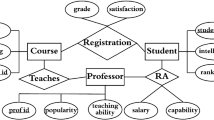Abstract
Factor space theory was first proposed in the 1980s with the rough set theory. After 30 years of development, factor space theory has established its completed theoretical architecture in mathematics; it has been proved very useful in causal analysis, intelligent reasoning and decision making. This paper proposes a Factor Query Language (FQL)—an SQL-like query language for operating the Factor Pedigree to make the factor space theory easily and widely used. First, the concepts associated with factor and factor space are presented. The factor pedigree which builds by knowledge increase and concept partitioning is presented; an XML specification–based storage method is also proposed for storing the factor pedigree. Next, the FQL (including FQL statements for insert, delete, update and select operations) is proposed. Two kinds of node encoding of factor pedigree strategies (interval-based encoding and prime + binary string-based encoding) are designed. They can facilitate the FQL query performance efficiently. The Factor Base Management System (FBMS) architecture and module functions are also presented.







Similar content being viewed by others
Data Availability
Data and Code are not available.
References
Wang PZ, Ouyang H, Zhong YX et al (2016) Cognition math based on factor space. Ann Data Sci 3(3):281–303
Yuan XH, Wang PZ, Lee FS (1992) Factor space and its algebraic representation theory. J Math Anal Appl 171(1):256–276
Wang PZ (1990) A factor spaces approach to knowledge representation. Fuzzy Sets Syst 36(1):113–124
Pawlak Z (1982) Rough sets. Int J Comput Inform Sci 11(5):341–356
Olson DL, Shi Y (2007) Introduction to business data mining. McGraw-Hill/Irwin, New York
Shi Y, Tian YJ, Kou G, Peng Y, Li JP (2011) Optimization based data mining: theory and applications. Springer, Berlin
Tien JM (2017) Internet of things, real-time decision making, and artificial intelligence. Ann Data Sci 4(2):149–178
Shi Y (2022) Advances in big data analytics: theory, algorithm and practice. Springer, Singapore
Liu F, Shi Y (2020) Investigating laws of intelligence based on AI IQ research. Ann Data Sci 7:399–416
Peng XT, Kandel A, Wang PZ (1991) Concepts, rules, and fuzzy reasoning: a factor space approach. IEEE Trans Syst Man Cybern 21(1):194–205
Wang PZ, Liu ZL, Shi Y et al (2014) Factor space, the theoretical base of data science. Ann Data Sci 1(2):233–251
Zhang C, Naughton J, DeWitt D et al (2001) On supporting containment queries in relational database management system. ACM SIGMOD Rec 30(2):425–436
Wu XD, Lee ML, Hsu W (2004) A prime number labeling scheme for dynamic ordered XML trees. In: Proceedings of the 20th international conference on data engineering, pp 66–78.
Ko HK, Lee SK (2010) A binary string approach for updates in dynamic ordered XML data. IEEE Trans Knowl Data Eng 22(4):602–607
Funding
The work is supported by the National Natural Science Foundation of China (no. 61772249), and partly by General Research Project of Liaoning Education Department (no. LJKZ0355).
Author information
Authors and Affiliations
Corresponding author
Ethics declarations
Conflict of interest
On behalf of all authors, the corresponding author states that there is no conflict of interest.
Author Contributions
**angfu Meng, **g Wen, Jiasheng Shi, and Zihan Li are responsible for FQL and Index strategy design, Peizhuang Wang contributes the Factor Space Theory, and **xia Zhu is responsible for presentation and figures and tables checking.
Additional information
Publisher's Note
Springer Nature remains neutral with regard to jurisdictional claims in published maps and institutional affiliations.
Rights and permissions
About this article
Cite this article
Meng, X., Wen, J., Shi, J. et al. Factor Query Language (FQL): A Fundamental Language for the Next Generation of Intelligent Database. Ann. Data. Sci. 9, 539–554 (2022). https://doi.org/10.1007/s40745-022-00391-y
Received:
Revised:
Accepted:
Published:
Issue Date:
DOI: https://doi.org/10.1007/s40745-022-00391-y




